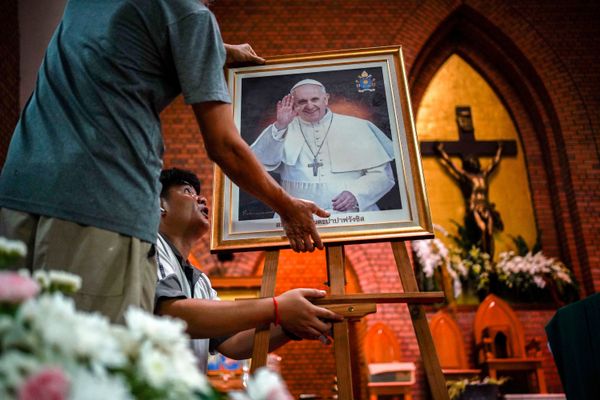VATICAN CITY, April 22 — Pope Francis, the first Latin American leader of the Roman Catholic Church, died yesterday after suffering a stroke and cardiac arrest, the Vatican said, ending an often turbulent reign in which he sought to overhaul an ancient and divided institution.
He was 88, and had suffered double pneumonia this year, but his death came as a shock after he appeared in St Peter's Square in an open-air popemobile to greet cheering crowds on Easter Sunday, suggesting his convalescence was going well.
"Dear brothers and sisters, it is with profound sadness I must announce the death of our Holy Father Francis," Cardinal Kevin Farrell announced on the Vatican's TV channel.
"At 7.35 this morning the Bishop of Rome, Francis, returned to the house of the Father."
Francis died of a stroke and irreversible cardiovascular arrest, Vatican doctor Andrea Arcangeli said in the death certificate, which was released by the Vatican. It added that the pope had fallen into a coma before he died.
Besides his recent lung infection, Arcangeli said Francis had also suffered from high blood pressure and diabetes.
A Vatican spokesman said the pope's coffin might be moved to St Peter's Basilica as early as tomorrow morning to allow the faithful to pay their respects.
No date has yet been given for the funeral, but the Vatican said it would normally be expected to take place sometime between Friday and Sunday. A group of cardinals were due to meet today to discuss plans.
US President Donald Trump said he would attend the ceremony, which was expected to draw dozens of other world leaders to Rome. Meanwhile, Francis' native Argentina ordered seven days of mourning, as did neighbouring Brazil.
"The pope of the poor has left us, the pope of the marginalised," said Jorge Garcia Cuerva, the archbishop of Buenos Aires, a position Francis once held.
Francis had on Sunday made his first prolonged public appearance since being discharged from hospital on March 23 following a 38-day stay for pneumonia, occasionally waving to onlookers and greeting a child who was brought to his side.
In an Easter Sunday message read aloud by an aide as the pope looked on from the main balcony of St Peter's Basilica, the pontiff had reiterated his call for an immediate ceasefire in Gaza — a conflict he had long railed against.
At the Vatican, locals, tourists and pilgrims visiting for Easter expressed their shock and grief.
"This is something that really hits you hard," said Emanuela Tinari from Rome. "He was a pope who brought so many people closer to the church. He was not appreciated by everyone. But he definitely was by ordinary people."
Future conclave
A conclave to elect a new pope normally takes place between 15 and 20 days after the death of a pontiff. Some 135 cardinals are eligible to take part in the highly secretive ballot which can stretch over days. At present there is no clear frontrunner to succeed Francis.
Born Jorge Mario Bergoglio, the Argentine cleric's election as pope on March 13, 2013, surprised many observers who had seen him as an outsider.
He sought to project simplicity into the grand role and never took possession of the ornate papal apartments in the Apostolic Palace used by his predecessors, saying he preferred to live in a community setting for his "psychological health".
He initiated changes within the Vatican, emphasising transparency, accountability and financial reform, and appointed more women to senior posts in its hierarchy.
However, Francis was also viewed as a haphazard leader, often blindsiding Vatican officials with his off-the-cuff comments.
He struggled to get a grip on the church's crisis over sexual abuse by clerics. He inherited a church torn by infighting in the Vatican bureaucracy, and was elected with a clear mandate to restore order.
But as his papacy progressed, he faced criticism from conservatives, who accused him of trashing cherished traditions. He also drew the ire of progressives, who felt he should have done much more to reshape the 2,000-year-old church.
While he battled with internal dissent, Francis became a global superstar, drawing huge crowds on his many foreign travels as he tirelessly promoted interfaith dialogue and peace, taking the side of the marginalised, such as migrants.
Francis appointed nearly 80 per cent of the cardinal electors who will choose the next pope, increasing the possibility that his successor will continue his progressive policies, despite the strong pushback from traditionalists.
Pope Francis confirmed in his final testament that he wished to be buried in Rome's Basilica of Saint Mary Major and not at St Peter's Basilica in the Vatican, unlike many previous pontiffs.
The Vatican released his final testament in the evening of his death.
The text specified that Francis wanted to be buried "in the ground, without particular decoration" but with the inscription of his papal name in Latin: Franciscus.
— Reuters




